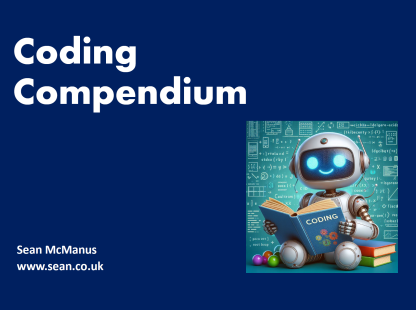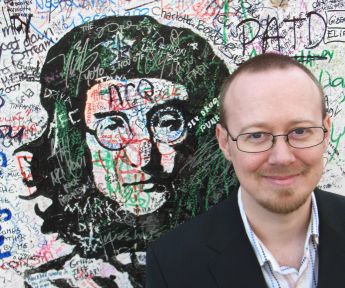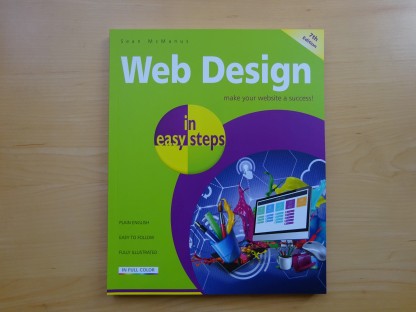
Coding Compendium
A free 100-page ebook collecting my projects and tutorials for Raspberry Pi, micro:bit, Scratch and Python. Simply join my newsletter to download it.
'Earworm' is a satire of the music industry that reveals what happens when somebody discovers the perfect song. In this interview, Sean McManus explains what inspired the story and why he decided to self-publish it.

Sean McManus photographed at Abbey Road with John Lennon graffiti.
Photo by Karen McManus
It's a satire of the music industry, centred around one of the last surviving major record labels, Bigg Records. Bigg is gobbling up independent labels and marketing lowest-common-denominator tosh made by boybands. Despite that, the company's got the nation's ear. So, many genuinely talented musicians dream of being signed by Bigg.
Dove's burned out from touring for decades. He wants to break up his 'creatively bankrupt' band, University of Death, but he couldn't do a proper job. Now Bigg's bought up the indie label the band was on, he's about to make Dove an offer he can't refuse.
Simon and Fred have a band called Goblin (performing a mix of rock and glam they call 'heavy tinsel'). Like many bands today, they can't get anyone to listen to them, and hope that Bigg will pluck their demo from the pile and launch their careers. As well as doing their own stuff, they cover University of Death in the hope that they'll catch someone's ear. As it turns out, their cover gets them into all kinds of trouble...
And there's a guy called Jonathan, who's a bit of a geek, and has come up with what is statistically the perfect song. Bigg's got sick of everyone trying to bend his ear, so his whole company is built to keep good ideas out, but Jonathan's determined to break in and land a deal. The fate of the whole record industry depends on what happens next...
As you might expect, all the threads tie up neatly in the end.
When I started to write, I only had the bare bones of a story. The idea of Jonathan's program Plato was already there, but the way it tied up with Bigg's company and the way that Dove became embroiled in it only emerged during writing. One reason it took so long to write is that I rewrote several sections completely when I came up with stronger ideas for them.
It's on its knees. The labels blame piracy because they can't believe people can do without what they're selling. There's a much wider range of entertainments available today, though, and a lot of people are spending elsewhere. Sony BMG was caught hiding software on PCs to try to stop people copying their music. That happened after I'd plotted my story, but it shows how desperate the labels have become. It was good timing for my plot.
The story I've sketched could be true. Obviously, it isn't. But it's not that far a stretch to imagine that somebody somewhere could have come up with a system for creating perfect music that is causing all this upset in the industry. And most of the technical components required are already out there. It just needs somebody to glue them together.
The most obvious one is writing about music. Elvis Costello, Frank Zappa and a host of others have been quoted as saying: "Writing about music is like dancing about architecture". And it's true. It's difficult to write about sounds in a way that means something. Luckily, so little of the music industry is actually about music! I think there's only one bit where I used onomatopoeia, and it worked well there. I love the idea that everyone will have a different mental image (if that's the right word) of what Simon's, Jonathan's and Dove's music sounds like.
There's quite a lot of technology in the story too, but I've spent years explaining technology in magazines, so that wasn't too tricky. The challenge was to drip-feed it into the story, rather than having a massive chunk of 'how this works', which would break the illusion and disturb the story flow.
As anyone who's ever written a book will know, the biggest challenge is time management and planning. I've written some tips on novel-writing for others. I'm not bigging myself up as an expert on writing - just sharing my own experience, as someone who's written a novel around a full time job, which many others would like to do.
This is my first novel, but I've written a few non-fiction books. My first book was a translated biography of Jean-Michel Jarre which was published in 1990. I've also written a programming tutorial for the Amstrad, and Small Business Websites That Work which was published by Prentice Hall. I co-authored The Customer Service Pocketbook.
(Update in 2015: I've written ten non-fiction books since Earworm. It really got me into the habit of writing again!)
They say everyone has a novel in them. This is mine: it includes so many of the things I love - music, technology, record collecting, retrogames, jokes. But all of them in service of a story and bound together by a single theme. Everyone has something that they just know they have to do in their life, and writing a novel was one of mine.
It's been a long time since I've devoted that much energy to a single project, and it was extremely satisfying. I really enjoyed the writing sessions.
I'm passionate about music, and I wanted to try to get that feeling across. There are some bits that are quite cynical about how the industry works, but I didn't want the story to lose sight of the joy that music brings both to its creators and its listeners. So the story is true in so far as it reflects how I feel about some of my favourite music, and how I feel when I'm writing songs.
But there's no music journalist character, even though it might have been a useful plot device. The only bit I've borrowed from real life is the cabbage factory, and that was from a friend's life.
I made the 'Berlin soundcheck' music on Dove's MySpace page using some sample sequencing software that I bought at a record fair. (Update in 2015: I've now posted this on SoundCloud as Berlin Soundcheck by University of Death)
Nearly all of the lyrics in the book were written in character for the story. The song 'Stay Dead' is one I wrote years ago, though, for myself. At the time, there was a mobile phone advert that starred John Lennon and a car advert that starred Steve McQueen. It just seemed so wrong that companies were allowed to exploit the images of these stars to flog stuff that was invented years after they died. If John Lennon were around today, it's hard to imagine he would be using his 60s image to sell a phone. Goblin's song 'Inconsistencies' takes its chorus from one of my songs too. The first line of Jane's song is from one of the first songs I wrote. So some songs and song fragments in the book do have melodies and chords to go with the lyrics.
The song title Animal Reined came from an aborted idea about Dove using the song title as his password. The idea was that someone would click on a file called 'password' or something and it would show the message 'lamina denier', and they'd then mutter something about the typo (should be 'denied') and fruitlessly look around for a plastic pass to unlock the PC. 'Lamina Denier' is the words 'Animal Reined' backwards, of course, which Dove had noted in a text file because he had a bad memory. It seemed like a good idea, but it was horrible to read, so only the song title remains. Actually, thinking it about it, it was a pretty lame idea too.
The songs in the book only run to a verse and chorus and there's only a handful of them. I didn't want to try people's patience by having great long tracts of lyrics - there just needed to be enough to tell the story, like in films when they show an excerpt of a performance to represent a whole concert.
Originally Dove's band was called Salvation Amy, but I found there was a real band with that name in the US. I liked the idea of University of Death (a pun on University of Life) because it opened up all kinds of theatrical possibilities for their stage show. Writing about music is difficult, but it became easier to convey the excitement of a concert once there was more of a spectacle. Most of the bands I've truly loved have provided a 'show' over and above the music performance, so it made it easier for me to believe in the band as well.
In the story, Jonathan finds an automatic system for naming bands. That really does work, and I included 101+ band names as a bonus at the back of the original edition of the book to prove it.
Plenty! I filled six pocket notebooks with ideas, and about half of them didn't get in. Some were mutually exclusive, but others there just wasn't room for.
It might have been nice to have had a real superstar character in there, someone like Prince, who lives like royalty. But there wasn't a need for it and I didn't want to make the story mis-shapen by grafting an unnecessary character on. It would probably have been hard to communicate that kind of character without resorting to movie clichés, in any case. There's so much written about fame already, and for me it was more interesting to look at the people who weren't famous: the z-list.
I've included a couple of other deleted scenes as a bonus at the end of the book. It's like a DVD on paper!
As well as a couple of deleted scenes, there are some snippets of pop trivia, updated in 2015. Some of the unlikely stuff that goes on in the story has its basis in fact, so I thought it would be interesting to highlight that. Some of it came true after I'd written about it, which felt odd.
That's a long list. I had a bit of an 80s 12" phase and discovered the fantastic gloomy synth music of Gary Numan. I also listened to Music for Airports and Thursday Afternoon by Brian Eno quite a bit. Many of my favourite acts came back out of retirement while I was working on the book, including David Gilmour (of Pink Floyd), Kim Wilde, Tanita Tikaram and Jean-Michel Jarre. I used to listen to their music while I was programming games in the late 80s and that was probably the last time I took on a creative project with a similar scope, so it was nice that they had new stuff out. It helped get me into the right frame of mind, strangely.
I went to see Prince six times during his O2 residency, towards the end of the writing project, so I listened to a lot of his stuff during the editing. The newer stuff I played included Amy Winehouse, Lily Allen, The Pipettes, Franz Ferdinand, Kaiser Chiefs and The Killers. And I'm always going back to albums by Black, Inspiral Carpets, They Might be Giants, Bruce Hornsby, Guns & Roses, Jesus Jones, My Life Story, Kenickie and dozens more. Right now, I'm listening to the Robert Plant/Alison Krauss album.
Douglas Adams is brilliant: he draws on such diverse ideas and writes fine observational comedy. Hitchhikers was great on the radio, but the Dirk Gently novels are his best printed work. The way they draw together and close so many different storylines neatly at the end is so much more satisfying than the way the Hitchhikers novels seemed to be a slice from an infinite story. Ben Elton at his best (eg Past Mortem, This Other Eden) is superb. I grew up with child diarist Adrian Mole. Sue Townsend has done a great job of chronicling Mole's adult life in the last few years (The Cappuccino Years, and Adrian Mole and the Weapons of Mass Destruction).
I loved Dave Thompson's book 'The Bowie Letters'. He's a music journalist and this is his only work of fiction I know of, a compendium of letters supposedly written by a Bowie fan to the man himself over a 30 year period. The letters show how a fan's relationship with an artist changes over both their lifetimes.
I recently read Chuck Palahniuk's book Lullaby. He writes with great economy and style.
I tend to read more non-fiction than fiction. I enjoyed Jacob Slichter's book 'So you wanna be a rock & roll star', which is a drummer's-eye view of being in a successful band (Semisonic). I read that book before I found the band's music and it still worked brilliantly. I also liked Dez Dickerson's self-published book about his time working with Prince in The Revolution, although that's more a book for hardcore Prince or Dez fans. Bill Drummond's 45 is a great insight into a unique creative mind. Brian Eno's 'Year with Swollen Appendices' is bursting with ideas, too.
The short answer is that it enables me to get the book out there more quickly.
If a conventional publisher expresses an interest, I'd be delighted to sign a contract. It would be able to reach many more people than I can. But I didn't want my book to go stale while I tried to persuade a publisher to take an interest in it. Publishers are inundated with manuscripts and authors can spend years marketing their books without the certainty they'll ever be conventionally published. Now that self-publishing is risk-free (financially, at least), it seems the smarter option.
There is an issue of credibility with self-published books. But since I've been a professional writer for ten years, I'm pretty confident of the quality of my book. I've written for magazines including Melody Maker, Making Music, Future Music, Internet Magazine, and Business 2.0, and had non-fiction books published by Prentice Hall and Management Pocketbooks among others. Readers can preview the book on the Amazon website too, and read a few chapters to reassure themselves.
The book is available in print and on Kindle from Amazon worldwide. I've added some direct links to buy it in my shop.
I really do appreciate every sale. There's no marketing budget for this, so every sale and mention in a blog or newsletter is going to make my day. Please let me know if you write a review or plug for the book. Thank you for your support.
Highly unlikely. The story as it stands is well-rounded and has a beginning, middle and an end. It doesn't really need a sequel. I'll be taking a break from writing for a while, firstly so I can spend some time promoting this book and secondly for a rest.
Find out more about Earworm here, and order your copy from Amazon using these links.
© Sean McManus. All rights reserved.
Visit www.sean.co.uk for free chapters from Sean's coding books (including Mission Python, Scratch Programming in Easy Steps and Coder Academy) and more!

A free 100-page ebook collecting my projects and tutorials for Raspberry Pi, micro:bit, Scratch and Python. Simply join my newsletter to download it.

Web Design in Easy Steps, now in its 7th Edition, shows you how to make effective websites that work on any device.

Power up your Microsoft Excel skills with this powerful pocket-sized book of tips that will save you time and help you learn more from your spreadsheets.

This book, now fully updated for Scratch 3, will take you from the basics of the Scratch language into the depths of its more advanced features. A great way to start programming.

Code a space adventure game in this Python programming book published by No Starch Press.

Discover how to make 3D games, create mazes, build a drum machine, make a game with cartoon animals and more!